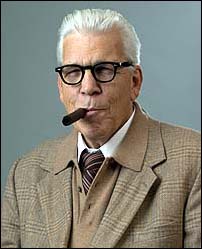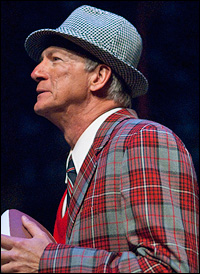
*
The producers of Lombardi, the new play about the Green Bay Packers football coaching legend Vince Lombardi, must wake up in the middle of the night sometimes wondering if it's possible to sell a sports-themed play on Broadway. The street, after all, hasn't historically been a haven for tales of the gridiron and the diamond, and "theatregoer" and "sports fan" are descriptors that are rarely shared by the same ticket-buyer.
In fact, Lombardi producer Fran Kirmser admitted that she and her colleagues would sometimes "look at each other and say, 'Oh, my God! How are these two — we call them sides of the orchestra — gonna come together? The sports side and the theatre side.'"
Those producers, then, might be encouraged by the following remarks.
"It was the biggest selling play in the theatre's 25 years." "It is the most successful play in our history in terms of box office and attendance."
The first comment was made by Michael Vigilant, the chief operating officer of the Alabama Shakespeare Festival, which produced a play in 2009 called Bear Country, about famed University of Alabama football Coach Paul "Bear" Bryant. The second came from Ted Pappas, artistic director of Pittsburgh Public Theater, which has produced The Chief, a play about famous Pittsburgh Steelers founding owner Arthur J. Rooney, Sr. seven times since 2003. The two productions are part of a recent, unexpected rash of regional plays that focus on towering sports figures. Others include librettist Buddy Farmer's musical Knute Rockne All-American, seen in the Chicago area, and When the Lights Come On, written by former college football player and coach Brian Letscher, for Michigan's Purple Rose Theatre Company.
The Chief is probably the oldest entry in this unlikely trend. The one-man show was co-authored by Rob Zellers, director of education at Pittsburgh Public, and Gene Collier, a sports writer for the Pittsburgh Post-Gazette. The two men brought a draft to Pappas, who sent them back to the drawing board. With the second draft, though, Pappas took a leap of faith. "I took the risk," Pappas told Playbill.com. "I said, 'Let's produce it even though it needs work.'" Tom Atkins, who knew Rooney as a young man, was hired to play the title character.
| |
 |
|
| Tom Atkins as Arthur J. Rooney, Sr. in The Chief |
Vigilant had a similar experience. He said about 50 percent of the audience for Bear Country had never been to ASF, located in Montgomery, before. A lot of these newbies were men, who came to the show wearing red, the color of the University of Alabama football team. "We were surprised to see RVs in the parking lot, where people were tailgating," recalled Vigilant.
"People who normally wouldn't go to a play will come see this," Farmer said of Knute Rockne, which played in Indiana in 2008. (Ironically, early versions of the work included Bryant and Lombardi as characters.)
Thomas Kail, the director of Lombardi, expects the Eric Simonson play to usher in a new Broadway audience. (Full disclosure: Lombardi was written by this reporter's brother.) "There's an opportunity here to have a lot of folks who aren't often invited to the dance on Broadway or Off-Broadway, or even regionally, to have a show that can speak to them," Kail said. "I would love to stand outside and see the traditional theatregoer standing alongside someone who's going to their first or second play."
Kail already saw that happen at the Mahaiwe Performing Arts Center in Great Barrington, MA, where Lombardi tried out in July. "There were definitely people who were wearing Brett Favre jerseys who had never seen a play before," he recalled. "It was a diverse audience. There were kids going with their parents. We had a performance where we had 90 kids from a sports camp, between 8 and 18 in age." He added, "Hopefully, there's a movement to be more inclusive in the theatre, and this is part of that wave."
Lombardi producer Kirmser, too, thought that the play "is an opportunity to bring new people into the theatre. We need new people coming to the theatre." She mentioned the support provided by the National Football League, a co-producer, as helping in that direction. "They are converting media outlets. For instance, we will have a billboard that's traditionally a sports billboard in Times Square dedicated to Lombardi for a couple of months."
An item of received wisdom in the theatre is that, when it comes to play selection, women have the purchasing power. In the case of these sports plays, however, while women are still the ones often buying the tickets, they were buying them with the idea that this might be a play their husbands or boyfriends would willingly go to.
"We know a lot of women were buying tickets for it," said Vigilant. "And we know that a lot of people purchased them as holiday gifts [for men]."
| |
 |
|
| Rodney Clark as Bear Bryant | ||
| photo by Phil Scarsbrook |
While all of these plays find their central characters from the world of sports, in all cases the creators were careful to craft a work that had an appeal beyond the playing field.
Vigilant remembered, "When I started writing the play, I was almost anticipating that I was writing a Menopause, the Musical, but for football fans." But ASF producing artistic director Geoffrey Sherman told him, "No. Football can be the foundation of the play, but it has to be accessible to a wider audience." (The play did indeed go wide, at least locally — a later Birmingham engagement of Bear Country introduced a new audience to the work of ASF.)
"I think sports can be a wonderful foundation for a story," Vigilant continued. "Bear Bryant was a rags-to-riches story. It's also a story about a son's love for his mother, and a man who changed lives. I talked to so many players who said this man changed their lives: 'I'm a better husband, father, son. When I went through the Alabama mill, Coach Bryant made me different.'"
"I really used sports as a backdrop," Farmer said, putting it simply. "It's really a story about Knute Rockne, the man." "My feeling was to broaden it," Pappas said. "One of the bits of advice I gave the writers was to think of it as a story about America, in terms of there are a lot of cities like Pittsburgh in America, but it takes a remarkable man to help make a city great, and it takes a great city to create a remarkable man.
Pappas added, "I think the theatre's always attracted to larger-than-life characters, and a lot of the centerpieces of these plays are people with extraordinary personalities or incredible charisma."
Kail concurs. "For someone like Lombardi, his presence was so deeply and widely felt far beyond sport. I meet people who say, 'Oh, my dad used to watch his instructional video and my dad was an insurance salesman.'"
Producer Kirmser offered, "Vince Lombardi touched so many different sub-groups, almost subcultures. ...There's a whole educational sub-group [because] was a high school teacher until he was 45, when he finally got the lead coaching position with the Green Bay Packers. He went to Fordham University — they're coming out in droves. There's a lot of football communities. He died of colon cancer — The Colon Cancer Foundation is having an evening."
Bear Bryant actually came to life in the most cynically pragmatic of manners. "It's a very unromantic story," admitted Vigilant, who, in addition to helping run the business side of ASF is also a published playwright. "We were sitting in a budget meeting, when controller Derek Scott said, 'If we ever did a play about Bear Bryant it would be really successful.' And associate director Nancy Rominger turned to me and said, 'Mike, you've played football, you wrestled a bear — you do it.'"
Little did he expect how moving to him the resulting production would be. A woman who cuts hair at Vigilant's barber saw it. She then bought tickets for her granfather, who had been one of Bear Bryant's bodyguards. "He had never seen a play before," Vigilant said. "He had no clothes for theatregoing. So she bought him tickets to the show, bought him khaki slacks and a nice theatre shirt. She told me he had the most awesome time in his life. It was one of those moments where I go, 'Ah! That's why I like to do this!'"
(Robert Simonson has been Playbill.com's senior correspondent since 2006. Prior to that, he was the editor of Playbill.com for seven years. His most recent book, "The Gentleman Press Agent," was published by Applause Books in June. Contact him at [email protected].)
Dan Lauria and Judith Light talk about Lombardi:










